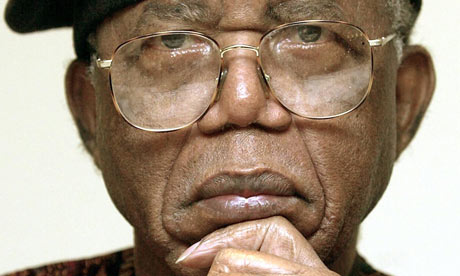
As soon as I heard about Chinua Achebe's rejection of the label "father of modern African literature", I did two Google searches. One, was for "father of modern European literature" for, surely, if modern African literature has a father, European literature could not possibly be a bastard. The second, was for "father of primitive African literature", since such a competent fatherless father (which in this case would be Achebe) would be something worth documenting. I hate to disappoint eager readers, but both searches drew a blank.
I thoroughly agree with Achebe's rejection of the label, because, as he has said, "there were many of us – many, many of us". The truth is, history is made up of what we choose to accept and shaped by what we reject, and to declare Achebe alone as the "father of modern African literature" is to skew the realities of the world's second largest continent, a place of multiple languages and identities, that has been sharing and writing stories for longer than the modern English language has existed. The irony, of course, is that the attempt to place Achebe atop the African literary family tree is due to a leaning towards work published in English. Such an approach negates the contributions of work in French, in which Sembène Ousmane and Léopold Senghor were published before Achebe; work in Arabic (a language spoken right across Africa due to the influence of Islam), such as Naguib Mahfouz's huge oeuvre of more than 50 novels and countless short stories; and, of course, work in Portuguese, Somali, Dutch, Hausa, Amharic and countless other indigenous languages.
Furthermore, there's a saying that's common in many parts of Africa, including Achebe's Igbo land, which was famously used by Hillary Clinton and which roughly translates as "it takes a village to raise a child". I think the saying is easily adapted for literature: it takes a people to create a literature and Chinua Achebe's rejection of the mantle of sole ancestor reflects this notion. However, the argument can be made that Achebe's role as editor of the Heinemann African Writers Series, an unsalaried position he held for 10 years, from 1962 to 1972, makes him, without question, a nurturer of African literature. During his tenure, he published writers from all corners of Africa, including now-famous names such as Ngugi wa Thiong'o, Ayi Kwei Armah, Tayeb Salih, Bessie Head and Okot p'Bitek, as well as nation builders such as Nelson Mandela, Kenneth Kaunda, Jomo Kenyatta and Kwame Nkrumah. The series, which published new work until 2003, was also a place of publication for writers such as Ben Okri, Tsitsi Dangaremba and Abdulrazak Gurnah before they became widely known. Achebe has said that he considers his work as editor of the African Writers Series to be more important than his achievements as a novelist and I can't argue with his assessment.
Chinua Achebe's work has been important to my own writing practice through the exploration of his ideas on Conrad and language use: I read and write with an understanding of prejudice in spite of a positive intellectual position, and accept my existence as a hybrid of ever-expanding ancestries, who thinks and writes in many languages. However my understanding of nuance, the notion of shades, the absence of a clear defining line between right and wrong in real life, which is central to my work, is something I learned not just from Achebe, but also from Mariama Bâ, Saul Bellow, James Baldwin and pirated Indian films watched in small spaces in Accra. Achebe is only one of my fathers.
And speaking of nuance, I return, being a classy Ghanaian, to Google: the phrase, "father of modern African literature" it appears, is taken from a Nadine Gordimer quote when Achebe won the international Booker in 2007; what she said was: "Chinua Achebe's early work made him the father of modern African literature as an integral part of world literature". Seen in context, what she said is very different to what the great man was asked to take on. We all reject it.

